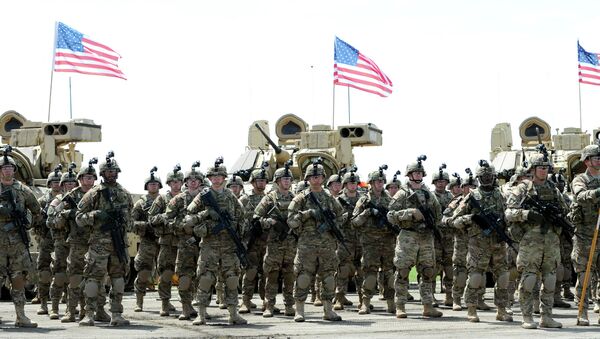Polish Defense Minister Antoni Macierewicz made the announcement on December 14 in the town of Zagan in Poland, where he met with Lieutenant-General Ben Hodges, commander of US land forces in Europe, according to the Associated Press.
While the US had originally planned to station four battalions in the Baltics, Poland and Romania by May 2017, Hodges said this has been moved forward to early January. Mr. Macierewicz, who helped found the Workers Defense Committee (the forerunner of Solidarity) in Poland, said he was "very happy" at the decision.
Hodges went on to say the Third Brigade Combat team, part of the US Fourth Infantry Division, was already en-route to the German port of Bremerhaven, and its equipment was currently being loaded onto ships. The troops and equipment will arrive January 6, 2017 and immediately be deployed in order to establish how quickly the force can move "from port to field".
"I'm confident in the very powerful signal, the message it will send [that] the United States, along with the rest of NATO, is committed to deterrence. I'm excited about what my country is doing and I'm excited about continuing to work with our ally, Poland."
#NATO #eFP enhanced Forward Presence #German mechanised infantry getting ready for deployment in #Lithuania in 2017: https://t.co/yRJuiczOS1
— Germany at NATO (@GermanyNATO) December 14, 2016
The deployment is supplementary to four battalions NATO has elected to permanently station in member states that border Russia by April 2017. According to that plan, 1,000 US troops currently stationed in Germany will be moved to Poland, 2,000 British and Canadian troops would be stationed in Estonia and Latvia respectively, and 1,000 German troops would be deployed in Lithuania.
No reason was given for the acceleration of the extraordinary deployment by either Hodges or Macierewicz, although the new timetable means troops will arrive before Donald Trump is inaugurated as President. Trump has suggested Europe should be less dependent on the US.
In a statement shared with Sputnik, Nikolay Bordyuzha, secretary-general of the Collective Security Treaty Organisation, said the West was now in "direct confrontation" with the Russian Federation.
"Military infrastructure is being created around the Russia, with heavy weapons and aircraft being transferred to the country's borders. Russia is well-prepared to defend its sovereignty and territorial integrity against any aggression from outside."
The ongoing NATO buildup in border states has certainly not gone unnoticed by the Russian government. In November, Viktor Ozerov, chairman of the Federation Council Committee on Defense and Security, announced Russia would install S-400 surface-to-air missiles and nuclear-capable Iskander systems in the exclave of Kaliningrad, which borders Poland and Lithuania, in retaliation for the NATO deployment of its missile 'defense shield' in Eastern Europe.
The Kremlin says the shield is not part of defense, but Washington's nuclear potential in Europe.


